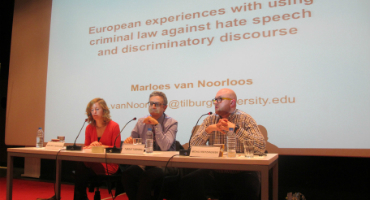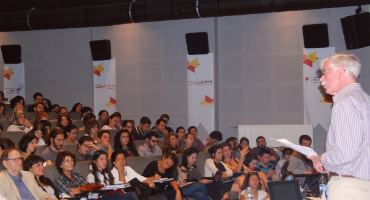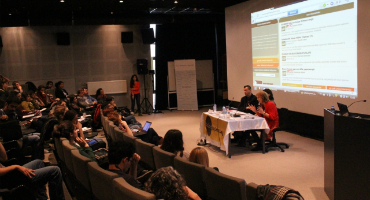The panel entitled “Discrimination and Hate on Media: Social media, representation of difference and activism against discrimination” was held, as an event organized by the Media Watch on Hate Speech Project, on October 23, 2014 at Demir Demirgil Hall in the Boğaziçi University. Ronald Eissens, one of the founders of the International Network against Cyber Hate and Dr. Gavan Titley from the Media Studies Department of the National University of Ireland, Maynooth, spoke at the panel, which was moderated by Dr. Idil Engindeniz from Galatasaray University’s Faculty of Communications.
Dr. Gavan Titley, in his speech entitled “The circulation of ‘hate’ in a hybrid media environment: System, context, contents”, touched upon different forms of circulation of hate speech in social media, emphasizing the importance of the context of each case in identifying hate speech and the content of hate. He also pointed at the importance of discussing how targeting and othering discourses circulating in our everyday lives are almost impossible to detect and unveil publicly, and how the meanings we attribute to such ‘invisible’ forms of hate speech matter in the struggle against hate speech.
Titley argued that hate speech is a political discourse and is directly related to ideologies. Additionally, he noted that when a particular discourse is identified as hate speech, it begets important debates on social values and freedom of speech. Subsequently, he emphasized the controversial debates around hate speech that is directed towards a group in a powerful position in a given context. Though hate speech is mostly directed towards historically oppressed, socially marginalized, and politically targeted identities, it may also be directed towards powerful groups or individuals because of their identities. In these cases, he said, hate speech is more controversial. Such cases require further discussion on the particular context and content of hate speech, and on the extent of the differences between the harms of hate speech on privileged groups and on disadvantaged identities. He claimed that when targeted and disadvantaged groups are silenced culturally and politically when subjected to hate speech, the powerful positions of the oppressors and dominant groups strengthen.
Finally, Titley highlighted the important role of social media in spreading such discriminatory and hateful discourses and described social media as a part of a public sphere, defining social media as “a constant invitation to discourse”.
After Dr. Gavan Titley’s speech, Ronald Eissens talked about ways of combatting online and other types of hate speech, emphasizing the power of words, and the importance of the connections between freedom of speech, web 2.0 and social media.
Eissens argued that hate speech that is not restricted or punished with the claims of freedom of speech leads to violence, extremism, and in many cases, murders. While he stated that freedom of speech is crucial for democracy, he mentioned that hate speech causes misery, division, violence, murder, abuse, ethnic tension, war and terror. This is why, he argued, freedom of speech should always be counterbalanced by legislation against hate speech towards oppressed and disadvantaged identities.
Eissens, while presenting the different campaigns and institutions that working on combatting hate speech and discrimination, mentioned the importance of discussion groups, online education and campaigns against hate speech, discrimination, and hate crimes. Additionally, he said hate speech didn’t start with social media but becomes more and more widespread with the new forms of communication provided by social media. He finished his presentation by rightly stating that "Hate speech is a grave danger and is growing -we can do something. Not doing anything is achieving nothing."
Ronald Eissens is General Director and co-founder of the International Human Rights NGO Magenta Foundation, based in Amsterdam. He is a board member and co-founder of the International Network Against Cyber hate (INACH), a network of organizations which counter cyber hate in 22 countries. Ronald has been responsible for national and international anti-racism and Human Rights projects since 1992. Along with Co-founder Suzette Bronkhorst, he instituted the world's first Complaints Bureau for hate on the Internet, created the First Sailing Internet connection (as part of an international anti-racism education project), organized food and medicine transports to the besieged city of Sarajevo, did unbiased live reporting through I CARE for the World Conference Against Racism in Durban, South Africa, web-casted the name-reading of all Dutch Jews murdered during the Holocaust and created awareness campaigns on extremism, antisemitism and Holocaust denial. He has published extensively on the subject of Cyber Hate and is an expert on online Antisemitism, Holocaust denial and counter-speech. He is also a member of the Online Antisemitism Working Group of the Global Forum to Combat Antisemitism.
Dr. Gavan Titley is university lecturer in Media Studies in Maynooth University, National University of Ireland. His research focuses on the politics of racism and multiculturalism in Western Europe, with a focus on media discourse and public culture. His most recent books include The Crises of Multiculturalism: Racism in a Neoliberal Age (2011, Zed Books, with Alana Lentin) and the co-edited National Conversations: Public Service Media and Cultural Diversity in Europe (Intellect 2014). He is currently completing a book on 'hate speech online' commissioned by the Council of Europe, and the book Racism and Media for Sage Publications. He writes for The Guardian.





